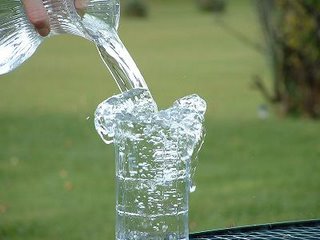Venezuela's Non-Paradox of Value
by Chris Buzzard While U.S. drivers cope with $3.00 a gallon gas prices, people in Venezuela are paying only $2.30. No, not $2.30 a gallon--$2.30 to fill a 19-gallon gas tank.
While U.S. drivers cope with $3.00 a gallon gas prices, people in Venezuela are paying only $2.30. No, not $2.30 a gallon--$2.30 to fill a 19-gallon gas tank.At 12 cents a gallon, Venezuela has the cheapest gas in the world thanks to government subsidies and President Hugo Chavez's vow to keep gas prices low. In fact, gas in Venezuela is cheaper than mineral water, a seeming violation of the Paradox of Value. The paradox describes the contradiction existing when many goods needed to sustain life have little economic value, while luxury items unnecessary for survival have very high economic values.
The classic illustration of this paradox is the disparity between the value of diamonds and water. Compared to diamonds, water is nearly worthless, yet you cannot survive without it. Meanwhile, diamonds have only aesthetic value and represent conspicuous consumption. In other words, water has high “use” value and low economic value, while diamonds have low use value and high economic value.
1. How does the paradox of value pertaining to water and petroleum hold elsewhere in the world, but not in Venezuela?
2. How does the scarcity question factor into the paradox of value?
3. Where else can the paradox of value be seen? (Hint: Think about the labor market.)
4. If Venezuela were to lift subsidies and let gas prices rise to a market-determined level, what economic and social effects could this have in Venezuela?
Topics: Paradox of value, Scarcity, Marginal utility, Subsidies



3 Comments:
At 9:36 PM, May 28, 2006, Jeff Shepley
said…
Jeff Shepley
said…
I'm not sure if this is a violation of the Paradox of Value which applies to both value and price. The price at which I purchase a good is related to its value (my demand curve). Yet if gas fell as rain and water was scarce, the prices would be drastically different (owing to supply) but the value would be no different (until we evolve to drink gas). So supply has a lot to do with it.
I just don't know if it is fair to claim a violation when the supply or price is artificial (not determined by the market). Although one could argue the supply of diamonds is held low, I think it is through a non-governmental monopoly which I guess is "natural."
At 2:57 PM, May 31, 2006, S. Salgado
said…
S. Salgado
said…
ok. The problem here is that the price of the gas is not been detarminated by the market, but this price is been determinated by the goverment. So, the the price is fixes in an unnatural way under the equilibrium price.
In the other hand we have that the water is more scarcely in Venezuela than the gas a for that reason, the price is high. Is not a problem with the value - paradox becouse the price of gas is not a market-determinated price.
--------
Visit
http://www.economiaentiemporeal.blogspot.com/
At 6:43 PM, August 13, 2007, Per Kurowski
said…
Per Kurowski
said…
21st Century Asocialism
The fact is that the pseudo democrat that loves to be called Commander and that governs Venezuela for soon nine years sells the gasoline in Venezuela for less than 3 cents of dollar per liter (10 US$ cents per gallon) less than the price of water, without even covering the costs of distribution. With this public policy our so called socialist continental champion transfers from the poorest of the poor to the owners of cars a subsidy equivalent to about 10% of the Venezuelan GDP. In oil producing country like Norway gasoline is sold at more than 60 times the current price in Venezuela. Currently the gasoline subsidies paid out in Venezuela to each vehicle surpasses the incredible average of 3.000 US dollars per year.
Also as a direct consequence of selling the gasoline in Venezuela for less than 3 cents of dollar per liter (10 US$ cents per gallon) instead of at its direct market opportunity cost and reinvesting the proceeds in public transport (and other needs) we have that in a country of only 26 million of inhabitants and a yearly GDP per capita of only around US$5.000 during 2006 there as a mind-boggling 350.000 new cars were sold and, from the sales during the first quarter of 2007, that figure is to be 400.000.
The new cars don’t find where to circulate in order to spew out their carbon emissions and therefore from an environmental perspective as well as from the perspective of what should be a more just distribution of those revenues obtained from liquidating a non renewable natural resource, there cannot be any doubt that in Venezuela we are in the hand of a cruelly asocial government.
Per Kurowski
perkurowski@gmail.com
http://www.ourpiedaterre.blogspot.com/
Please do not help empowering those who enjoy and win when we hate each other
Post a Comment
<< Home